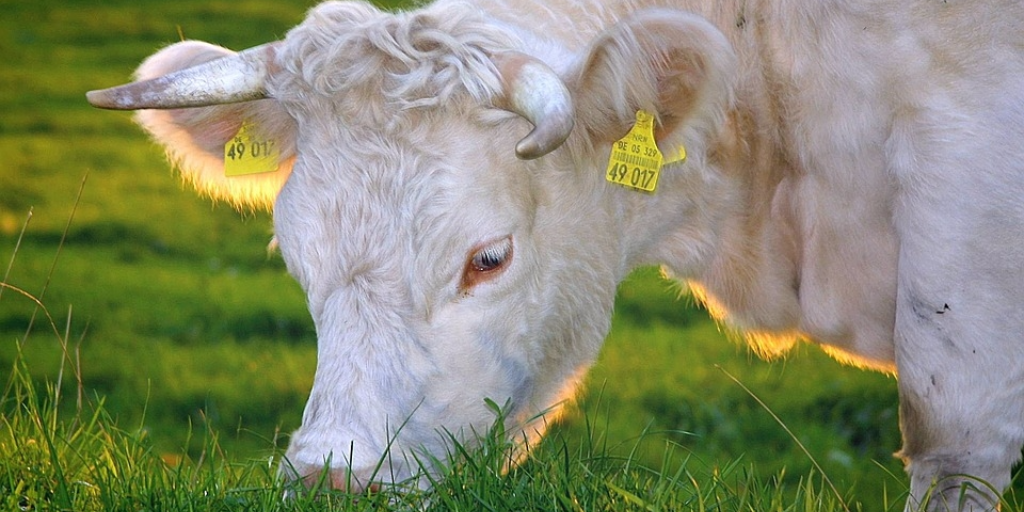Offer
Provide additional details about the offer you're running.

Which is Better and Why
It’s a topic of conversation that can easily escalate into a heated and lengthy debate, particularly when it comes to livestock farmers. If you like to live by the notion of ‘the more natural better’ then you will probably agree that grass fed beef is the way to go.
When compared with grain fed beef, grass fed beef;
From an animal rights perspective, grass-fed cattle are more likely to live out their days on open grassland, enjoying their natural diet. They are given the opportunity to enjoy a life of pasture grazing, which is a privilege denied to cows who are grain fed.
Grain fed cattle are often started on grass, then finished on a diet of soy and corn based grains. You might think that doesn’t sounds so bad… but the truth of it is that when on this grain based diet, they are placed in feedlots where they have no freedom to roam and are virtually forced to eat so that they grow bigger… faster. They are also likely eating GMO food in both corn and soy! This is the beef industry’s attempt to be able to supply beef to consumers all year long – as grass fed beef’s growth and therefore supply to butchers is very dependent on weather conditions. So, while grain fed beef means we can get beef whenever we like, it puts animal rights in question, jeopardises the quality of the beef we’re consuming and is most importantly, unnatural.
You see, cows aren’t naturally built to consume grain. They’re natural source of food is grass. Because of their dietary alterations, grain fed cattle can become unwell and are therefore often put on antibiotics. Combine this with the inclusion, by some farmers, of animal by-products in their diets and even steroids to get them fatter and to the abattoir faster – and it’s easy to see why grass fed is ALWAYS better. Remember, you are consuming what the animal has eaten, especially as many of those toxic ingredients are stored in the marrow and bones of cattle.
Grass fed beef is better for you – it’s better for the animals in question and it is better for our moral fibre... For our collective conscience. By consuming grain fed beef we are fuelling an industry that promotes the poor treatment of animals with unnatural conditions, feed and medication. I don’t know about you, but I’m not ok with that.
If you’re considering making the transition from grain fed to grass fed beef, be aware that the flavour of the meat can differ slightly as a result of their varying diets. Grass fed beef can omit a flavour that can only be described as grassy. It is also cooked differently to that of its grain fed counterpart.
If adjusting our tastebuds and the way we cook are the only hurdles we face when it comes to choosing grass fed over grain fed beef, then surely, it’s an easy switch. Doing right by our bodies and right by the animals we share the planet with seems like simple sense. It’s just a matter of spreading the word.
So be sure to ask this question when next buying your steak.. "Is it grass fed, start to finish?". Much of today's beef is labelled "grass fed" but is only grass fed at the beginning of the cow's life, not throughout.
Broth of Life uses certified organic produce; made from only grass fed beef
[1] Nutr J. 2010; 9: 10. Published online 2010 Mar 10. doi: 10.1186/1475-2891-9-10
A review of fatty acid profiles and antioxidant content in grass-fed and grain-fed beef
Cynthia A Daley,1 Amber Abbott,1 Patrick S Doyle,1 Glenn A Nader,2 Stephanie Larson2
https://www.ncbi.nlm.nih.gov/pmc/articles/PMC2846864/
[2] Asia Pac J Clin Nutr. 2006;15(1):21-9.
Effect of feeding systems on omega-3 fatty acids, conjugated linoleic acid and trans fatty acids in Australian beef cuts: potential impact on human health.
Ponnampalam EN1, Mann NJ, Sinclair AJ.
https://www.ncbi.nlm.nih.gov/pubmed/16500874
[3] Crit Rev Food Sci Nutr. 2017 Jan 2;57(1):1-7.
Systematic evaluation on the effectiveness of conjugated linoleic acid in human health.
Fuke G1, Nornberg JL1.
https://www.ncbi.nlm.nih.gov/pubmed/27636835
https://www.piedmont.org/living-better/the-difference-between-grass-fed-and-grain-fed-beef
http://www.buedelmeatup.com/2013/09/24/the-benefits-of-grain-and-grass-fed-beef/
https://draxe.com/grass-fed-beef-nutrition/
http://www.thekitchn.com/grassfed-vs-grainfed-beef-what-79032
http://www.healthline.com/nutrition/grass-fed-vs-grain-fed-beef
http://www.mayoclinic.org/diseases-conditions/heart-disease/expert-answers/grass-fed-beef/faq-20058059
https://chriskresser.com/why-grass-fed-trumps-grain-fed/